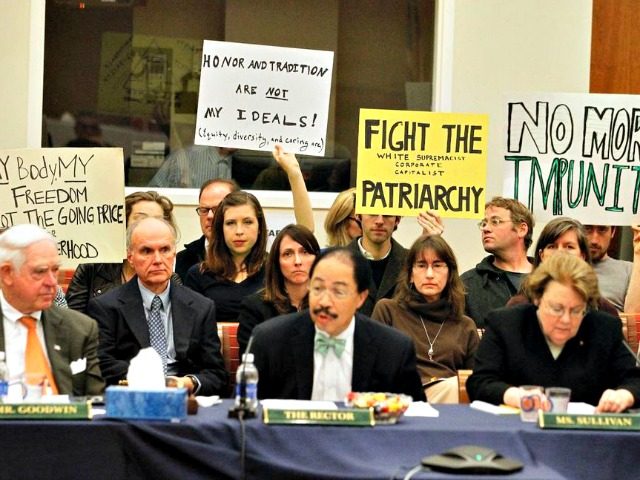U.S. Education Secretary Betsy DeVos is beginning to assess campus sexual harassment and assault practices put in place by the Obama administration, policies which many claim violate the due process rights of accused persons.
In April of 2011, former President Barack Obama’s deputies in the Office for Civil Rights (OCR) of the federal education department issued a “Dear Colleague” letter (DCL) which expanded Title IX anti-discrimination laws to include how colleges and universities address cases of sexual harassment and assault, as well as bullying.
The letter stated:
ED is issuing the DCL to explain that the requirements of Title IX cover sexual violence and to remind schools of their responsibilities to take immediate and effective steps to respond to sexual violence in accordance with the requirements of Title IX. In the context of the letter, sexual violence means physical sexual acts perpetrated against a person’s will or where a person is incapable of giving consent. A number of acts fall into the category of sexual violence, including rape, sexual assault, sexual battery, and sexual coercion.
The Obama administration’s letter sought to end cross-examination by accused persons in campus courts and rejected the traditional clear-and-convincing evidence standard of proof in school disciplinary procedures. Instead, the federal guidance instructed schools to use the “preponderance of the evidence standard to resolve complaints of sex discrimination,” which is used in most civil actions.
In a paper last October, Jed Rubenfeld of Yale Law School writes:
Sexual assault hearings are taking place at colleges and universities all over the country under the mandate of a 2011 Department of Education Dear Colleague letter. The procedures followed are secretive, sometimes inquisitorial, and frequently in violation of fundamental due process principles. Courts, however, have ruled that Due Process does not apply to sexual assault hearings at private schools because private schools are not state actors. These rulings are clearly mistaken.
On Wednesday, DeVos met with Chancellor Steve Wrigley of the University of Georgia System and Georgia state Rep. Earl Ehrhart, who has sued the federal education department over the 2011 guidance which, he says, is “unconstitutional,” citing a lack of due process for the accused.
As Politico notes, Ehrhart also spearheaded a measure in Georgia that would bar colleges and universities from taking on investigations into campus sexual assaults unless police are involved.
“You cannot make a law just because you’re some bureaucrat that lives in a hole in Washington, D.C., and you have a whim,” Ehrhart said in April of 2016 during an interview with NPR station WABE. “You don’t get to threaten the federal funds of the taxpayers of this nation to the universities and colleges in the country.”
“When you accuse someone of a crime, a heinous crime, or when you threaten their entire life and career and everything else and threaten to take that away, then it rises to the level of this type of due process,” he added. “We’ve made that very specific in the laws we have in Georgia. You can’t have an expectation that people on a college campus walk in there and their constitutional rights go away — they don’t.”
DeVos’s office did not provide details of the meeting with Wrigley and Ehrhart, saying only the “discussion touched on a broad range of higher education issues facing the state of Georgia, Georgia’s students, and its universities.”
DeVos is also slated to return to her home state of Michigan to meet with first lady Sue Snyder, wife of Gov. Rick Snyder (R), to discuss how the Michigan campus sexual assault prevention model may be one for other states to follow as well.
According to the Detroit News, Michigan recently announced grant funds totaling $506,000 for 18 community colleges and universities to create sexual assault prevention programs on campus.
DeVos’s department has also confirmed that Candice E. Jackson will become the deputy assistant secretary in the OCR. Jackson recently represented Kathy Shelton, who was 12-years-old in 1975 when Hillary Clinton defended the rapist who assaulted her. Shelton attended a news conference prior to one of the presidential debates in October.
Jackson told American Thinker that Clinton, “unethically and immorally blamed a twelve-year-old victim.”
A report in the New York Times cites Jackson’s appointment, as well as the nomination of Carlos Muñiz as general counsel to the U.S. Education Department (USED):
The posts are among the most high profile in the department. Staffing in the Office for Civil Rights has been a source of concern for civil rights advocates ever since the Trump administration rescinded protections for transgender students as one of its first education policy moves.
…
The appointments have been met with trepidation from advocates who are anxious about the future of the Office for Civil Rights, which gained a higher profile under President Barack Obama as it focused policy as much on equity in education as on achievement.
DeVos was ambiguous about the Obama-era Title IX policies during her confirmation hearing, stating it would be “premature” to commit to the enforcement of those policies at that time.
Asked by Sen. Bob Casey (D-PA) if she would uphold the Obama policies on sexual assault on college campuses, DeVos responded, “I know that there’s a lot of conflicting ideas and opinions around that guidance, and if confirmed I would look forward to working with you and your colleagues and understand the range of opinions and understand the issues from the higher ed institutions that are charged with resolving these and addressing them.”

COMMENTS
Please let us know if you're having issues with commenting.